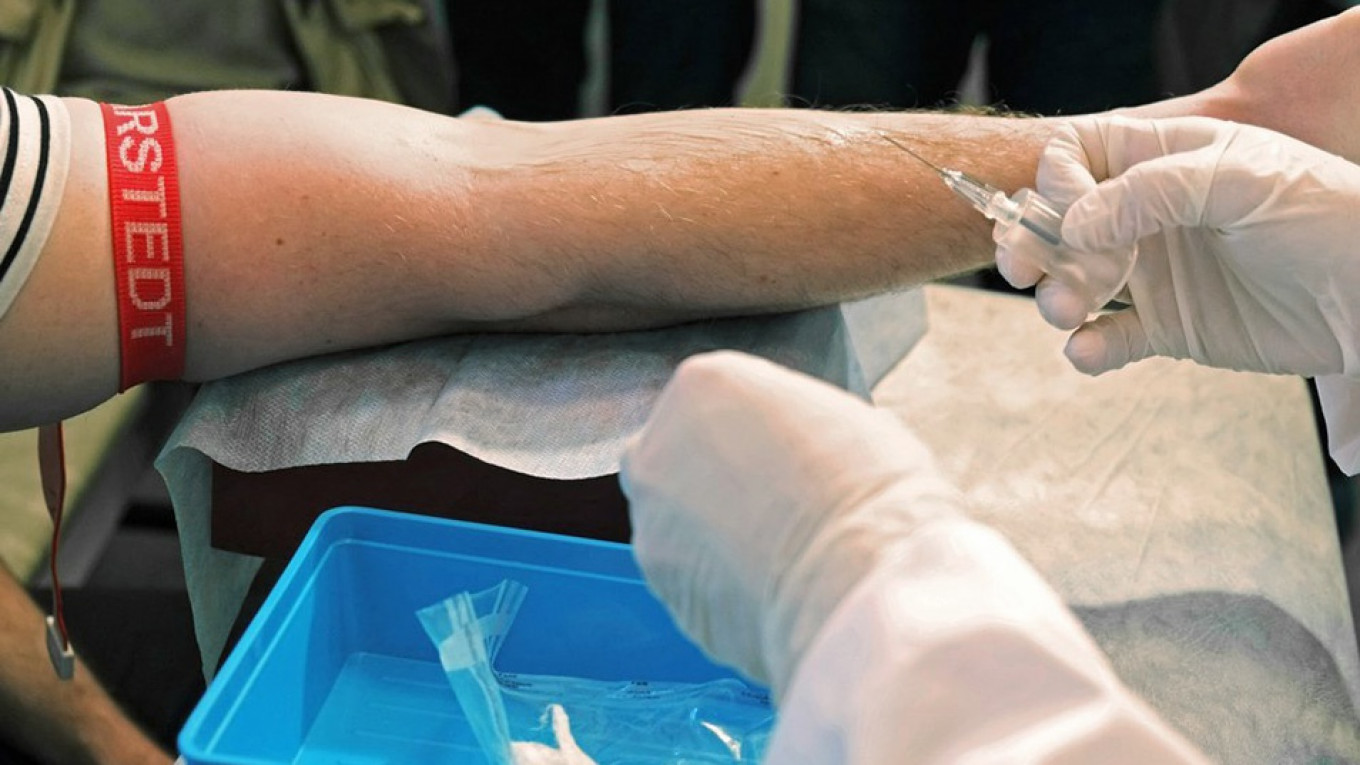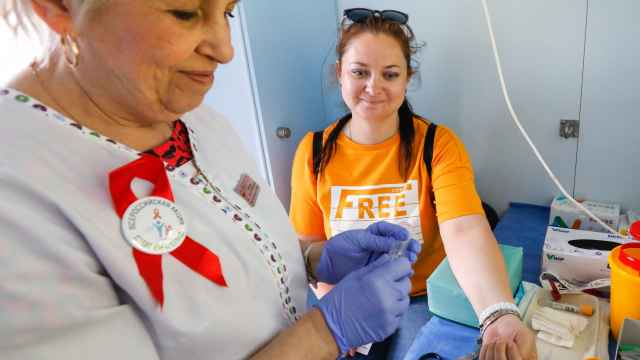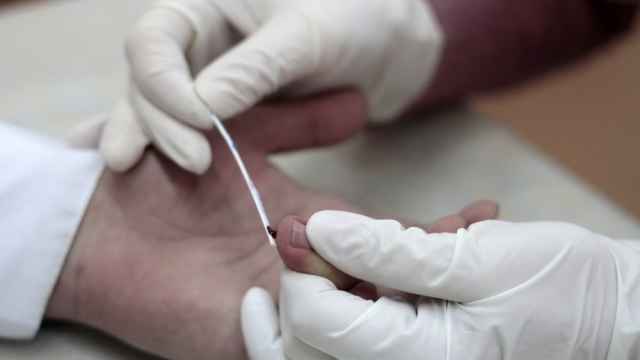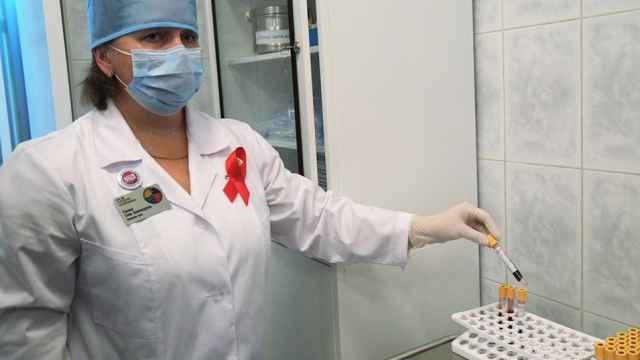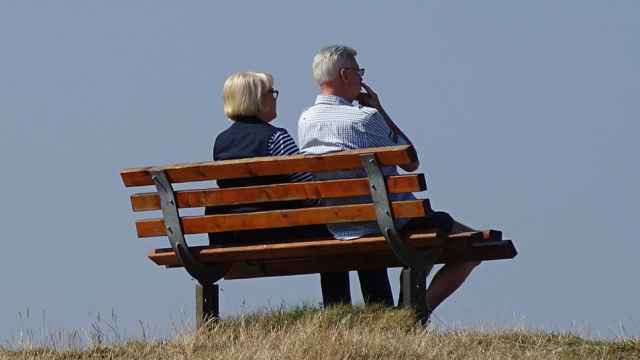Russia and some former Soviet Union countries risk developing out-of-control HIV epidemics, experts said on Wednesday, after data showed a record number of new cases last year.
Most new cases in the former Soviet Union in 2017 were from heterosexual sex as the disease spreads beyond high-risk groups, according to research by the World Health Organization (WHO) and the European Center for Disease Prevention and Control.
The increased rate of new diagnoses in the region since 2012 comes amid a global decline and Masoud Dara, HIV specialist at the WHO, said it could be "an early indication of overspill in the general population."
"HIV starts off [in] key populations — meaning drug users, commercial sex workers and men having sex with men — but after that it [increases] exponentially... if there is no more intervention," Dara told the Thomson Reuters Foundation.
In Russia, official data shows there were more than 104,000 new HIV diagnoses in 2017, taking total cases to more than 1.2 million. Experts have said this is probably an understatement.
"We don't have enough medication, we don't treat every patient," said Nikolay Lunchenkov, a doctor at the Moscow Regional AIDS Center.
"We are increasing the number of people who receive antiretroviral therapy, but it's still not enough."
The number of HIV treatment courses bought by the Russian government rose 37 percent to about 360,000 last year, according to the Treatment Preparedness Coalition, an NGO.
But methadone, which research has shown helps to prevent injecting drug users passing on HIV, is banned in Russia. Cases have increased in Crimea since it was annexed from Ukraine in 2014, The Moscow Times reported last year.
"We also don't have enough data about men who have sex with other men, because of high levels of stigma," said Lunchenkov, who is openly gay.
The number of Russian men who were infected with HIV through having sex with another man more than doubled to 695 between 2008 and 2015, according to official data.
Discrimination against LGBT+ people means those at risk of HIV/AIDS are afraid to seek out testing and treatment, experts say.
Russia was ranked Europe's second least LGBT-friendly nation in 2016 by ILGA-Europe, a network of European LGBT groups.
A requirement introduced in 2012 for some international NGOs working in Russia to register as "foreign agents" led to a decrease in organizations working with groups vulnerable to HIV, said Oli Stevens, a HIV researcher based in Britain.
"The message was very clear, MSM [men having sex with men] are not us, they are the other, they are not part of society we're trying to build," said Stevens.
Discrimination
In the rest of the former Soviet Union, new cases of infected drug users have fallen 45 percent to 6,218 a year in a decade, while new cases of heterosexual transmission increased 59 percent to almost 18,000.
Activists blame widespread discrimination against LGBT+ people for an eight-fold rise in transmission among men having sex with men, to more than 1,000 cases annually.
"State-sponsored homophobia and transphobia [have become] a crucial issue," said Yuri Yoursky of the Eurasian Coalition on Male Health, which supports men with HIV/AIDS in the region.
"In many of the states, governments are not accepting [the] LGBT community as it is, even though MSM are a vulnerable group," he said.
"Where human rights for LGBT [people] are not accepted, and are not free and protected for everyone, there cannot be efficient HIV prevention," Yoursky said.
HIV diagnoses are falling in the European Union and European Economic Area, thanks to more widespread testing, fast treatment and the roll-out of pre-exposure prophylaxis.
Transmission rates fell 20 percent between 2015 and 2017 among men having sex with men in the region, according to the WHO data.
Nonetheless, experts warned against complacency.
"If you look at the late diagnosis rates, which are still quite high, that tells us that there’s still much more to be done," said Matthew Hodson, executive director of NAM, a British HIV/Aids information charity.
A Message from The Moscow Times:
Dear readers,
We are facing unprecedented challenges. Russia's Prosecutor General's Office has designated The Moscow Times as an "undesirable" organization, criminalizing our work and putting our staff at risk of prosecution. This follows our earlier unjust labeling as a "foreign agent."
These actions are direct attempts to silence independent journalism in Russia. The authorities claim our work "discredits the decisions of the Russian leadership." We see things differently: we strive to provide accurate, unbiased reporting on Russia.
We, the journalists of The Moscow Times, refuse to be silenced. But to continue our work, we need your help.
Your support, no matter how small, makes a world of difference. If you can, please support us monthly starting from just $2. It's quick to set up, and every contribution makes a significant impact.
By supporting The Moscow Times, you're defending open, independent journalism in the face of repression. Thank you for standing with us.
Remind me later.


